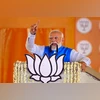By Mihir Sharma
To outsiders, it may seem unclear what the world’s largest election, which India will hold in stages starting at the end of this week, is all about. While we are dangerously short of jobs, unemployment doesn’t seem to be under discussion. Voters don’t appear to be as concerned about “democratic backsliding” as the liberal elite is. And, while the opposition is gamely trying its hand at caste- and region-based identity politics, Prime Minister Narendra Modi’s universal appeal renders such old-style politics irrelevant.
If you look a little closer, however, a picture of what Modi wants voters to focus on begins to emerge: the way India, under him, has become the center of the world.
Speaking at a rally last week in the pivotal state of Uttar Pradesh, the prime minister did not question voters about how fat their pocketbooks had grown during his two terms in office. “When India became the world’s fastest growing economic power,” he asked instead, “were you proud of it or not? When our Chandrayaan [space mission] hoisted the Indian tricolor [flag] on the moon, were you proud or not?” The pitch is simple: Modi Has Made India Great Again.
In small-town India, where election narratives are set by local television channels and neighborhood WhatsApp groups, there’s a relentless focus on India’s global image. The ruling Bharatiya Janata Party hammers home a consistent message: The world now beats a path to Modi’s door, paying him — and thereby all Indians — respect and expecting little in return.
Naturally, not everything about this story is strictly accurate. India’s apparently robust economic record doesn’t stand up to comparative scrutiny, for example. Its peers are doing far better at opening export markets and creating jobs.
Meanwhile, Modi likes to claim that previous governments sought Western aid while, under him, India has provided vaccines to the world. Unhelpful nitpickers might point out that India’s world-beating generics industry developed under previous governments — and, far from sending the vaccines it promised during the pandemic, India shut down exports in 2021 when the deadly Delta wave hit. Countries across the developing world that were counting on those doses arriving, particularly in Africa, were left empty-handed.
For many Indians, none of that matters. The crucial thing is that the world seems to be backing up Modi’s claims. Members of India’s vast Western diaspora, who are among Modi’s strongest supporters, loudly echo the BJP’s narrative. The prime minister himself told a diaspora crowd once that while they may have been ashamed of the backward country they had left, he had transformed their Indianness into a source of pride.
More From This Section
More to the point, last year’s G-20 summit in New Delhi seemed to showcase a parade of world leaders lining up to praise India. It matters little what they may have been saying in private. (Behind closed doors at that same summit, for example, US President Joe Biden was reportedly raising the difficult question of India’s possible involvement in assassinations on Western soil.) Before the cameras, Biden and others lauded India — and, by implication, Modi — for demonstrating global leadership at a fraught geopolitical moment.
For Western nations, such fulsome public tributes cost nothing, and they have the considerable benefit of keeping New Delhi on-side diplomatically. The dangers of withholding such approbation to populists is well-known: Consider how Turkey’s Recep Tayyip Erdogan basked in European adulation early on, and how much of a thorn in his neighbors’ sides he became when those encomiums turned to criticism.
Within India, however, the effect of such rhetoric is more complicated. Global praise for India, even from countries striving to remain neutral in the upcoming polls, translates directly into votes for Modi. Like many citizens across the Global South, Indians think a bit of respect for their country and civilization is overdue. And they believe Modi has finally delivered that respect. They will forgive him many things if the praise keeps rolling in.
For the opposition, this poses an extraordinarily difficult dilemma. If they question whether the world’s praise is warranted (or was even delivered), it sounds like they’re attacking India, not Modi.
Indian political analysts long assumed that the country’s politics was deeply insular and that foreign affairs didn’t win elections. This prime minister is proving them wrong. He won in 2019 after a cross-border clash with Pakistan. Now, he is handily dominating the opposition by hammering home the world’s approval of his stewardship. Indian politics is still about India — but now it is about how the world sees India.
Disclaimer: This is a Bloomberg Opinion piece, and these are the personal opinions of the writer. They do not reflect the views of www.business-standard.com or the Business Standard newspaper

)
